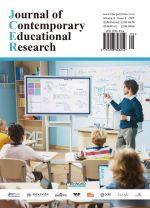Study on English Translations of “The Little Prince” from the Perspective of Descriptive Translation Studies
Abstract
In modern society, the globalization of literary works is evident, with exceptional literary pieces from various countries spreading worldwide. Among these, children’s literature, due to the specificity of its target audience, imposes distinct requirements on children’s books, compelling translators to approach the text from a child’s perspective. “The Little Prince” has renowned both within and outside of China, and a careful reading of this work can provide us with much inspiration. To this end, the present study adopts the perspective of Gideon Toury’s Descriptive Translation Studies to conduct an in-depth analysis of the different English and Chinese translations in conjunction with the original French novel. This approach aims to better guide literary research and explores translation methods for children’s literature through the analysis of translation norms and rules.
References
Wang X, 2014, Report on the Translation Project of “The Little Prince”, thesis, Nanjing Normal University.
Hou X, 2016, The Translation of “The Little Prince” Guided by Adaptation Theory, thesis, Beijing Foreign Studies University.
Wang D, 2020, A Study on the Development of Translation Theories Abroad, thesis, Beijing: Foreign Language Teaching and Research Press: 12.
Li Y, 2012, An Analysis of the Retranslation Phenomenon of “The Little Prince” from the Perspective of the Manipulation Theory of Translation, thesis, Guangxi University for Nationalities.
Zheng S, 2018, A Comparative Study of Three Chinese Versions of “The Little Prince” Based on Nida’s Functional Equivalence Theory, thesis, Jinan University.
He Y, 2019, Two Translations of “The Little Prince” from the Perspective of Skopos Theory. Northern Literature, 2019(24): 271–272.
Toury G, 1980, In Search of a Theory of Translation, thesis, The Porter Institute for Poetics and Semiotics.
Wang X, 2014, Report on the Translation Project of “The Little Prince”, thesis, Nanjing Normal University.
Toury, G,1995, Descriptive translation studies and beyond. John Benjamins Publishing Company.56-61
He Y, 2019, Two Translations of “The Little Prince” from the Perspective of Skopos Theory. Northern Literature, 2019(24): 271–272.
Li Y, 2012, An Analysis of the Retranslation Phenomenon of “The Little Prince” from the Perspective of the Manipulation Theory of Translation, thesis Guangxi University for Nationalities.
Hou X, 2016, The Translation of “The Little Prince” Guided by Adaptation Theory, thesis, Beijing International Studies University.
Zhang C, 2019, A Brief Discussion on the Chinese Versions of “The Little Prince”. Changjiang Series, 2019(10): 102–103.
Liang Y, Pan H, 2020, A Comparison of Linguistic Differences in Chinese Translations of “The Little Prince”—Taking the Two Translations by Zhang Xiaoxian and Zhou Kexi as Examples. Social Sciences and Humanities Education, 2020(2): 97–100.
Saint-Exupéry A, 2011, The Little Prince. Translated by Lin X. Changsha, Hunan Literature and Art Publishing House: 8.
Chen L, 2016, An Essay on the Integrated Language Education Model. Learning English (For Teachers), 2016(6): 4–8.
Zhang C, 2019, Brief Remarks on the Chinese Translated Versions of “The Little Prince”. Changjiang Collection, 2019(10): 102–103.
Zheng S, 2018, A Comparative Study of Three Chinese Translations of “The Little Prince” Based on Nida’s Functional Equivalence Theory, thesis, Jinan University.
Zhao D, 2011, Brief Remarks on Nida’s Functional Equivalence Theory. Literary Education (Middle School Edition), 2011(3): 54–55.
Cao Q, 1995, Nida’s Theory and Intercultural Translation. Journal of Zhejiang University of Social Sciences, 1995(3): 98–103.

